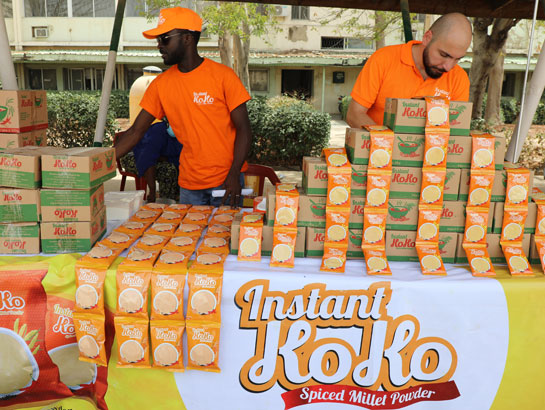Hallilco Foods Nigeria Limited is working with smallholder millet farmers in a contract farming program to improve the supply of iron and zinc-enriched millet for the production of nutritious food products. The contract farming program was facilitated in partnership with HarvestPlus Nigeria, through its Scaling Climate- and Nutrition-Smart Crops Through Market Systems in North Nigeria project funded with UK aid from the UK government through its Propcom+ program. This public-private producer partnership aims to improve the quality and quantity of millet production, create market access for smallholder farmers, and promote affordable, nutritious, and safe food products. This is part of the company’s efforts to strengthen and grow the climate-smart market for biofortified crops.
Hallilco Foods, an indigenous food processing industry located in Kano State, has begun its journey to diversify into the field of nutritious foods. The company has introduced iron and zinc-enriched millet as a new ingredient in the production of its famous product, ‘Instant koko,’ a brand of powdered porridge. To ensure a continuous supply of high-quality iron and zinc millet, Hallilco is collaborating with contract millet out growers in Gumel, Gagarawa, Gwaram, and Jahun, which are part of the local government of Jigawa State.
“Ever since I started processing biofortified iron and zinc enriched millet, I have seen increase in pap flour yield, it also provides my product with brighter color when compared with the conventional millet.” Abbas Fadlallah, CEO Hallilco Foods,Kano State Nigeria
This unique partnership, facilitated by HarvestPlus, offers an opportunity for contract farmers to receive certified millet seed enriched with iron and zinc free of charge from Hallilco. Technical support from the Jigawa Agricultural and Rural Development Authority (JARDA) ensures that the farmers are trained in best agronomic practices, quality control, and post-harvest handling. JARDA extension officers work closely with the contract farmers to improve environmental and social standards in millet production, including the adoption of climate-smart farming techniques.
To further build the technical capacity of extension officers, HarvestPlus, in collaboration with the Center for Dryland Agriculture (CDA) at Bayero University Kano, is partnering to provide specialized training on climate-smart agricultural practices. This initiative equips extension officers with the knowledge and tools necessary to support contract farmers in implementing sustainable farming methods and effectively adapting to climate change. The overarching goal of this partnership is to achieve a continued and sustained improvement in the climate adaptive capacity of smallholders in Northern Nigeria.
The collaboration involves more than 300 millet out-growers, who are expected to produce and deliver over 300 metric tons of iron and zinc-enriched millet to the millet aggregation center in Gumel town, in Jigawa. While the partnership primarily focuses on contract out-growers, other farmers growing the same millet variety outside of the partnership are also welcome to deliver their produce to the aggregation center, provided it meets the fixed minimum standards.
This public-private producer partnership represents a significant step towards improving the availability of nutritious food and promoting sustainable agriculture in Nigeria. By fostering collaboration, HarvestPlus Nigeria, Hallilco Foods, JARDA, and Bayero University Kano are not only driving positive change in the local food system and enhancing the nutritional value of millet-based products, but also strategically utilizing contract farming to establish a dedicated off-taker market, thereby scaling biofortification and enhancing the sustainability of market systems in Nigeria.
HarvestPlus Nigeria remains committed to its mission of reducing hidden hunger and improving the health and well-being of Nigerians through the production and consumption of nutritious food. This innovative collaboration marks an important milestone in achieving these goals and paves way for future partnerships that prioritize sustainable sourcing and inclusive agricultural practices.
